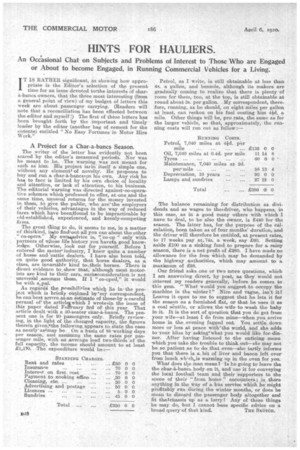HINTS FOR HAULIERS.
Page 20

If you've noticed an error in this article please click here to report it so we can fix it.
An Occ'asional Chat on Subjects and Problems of Interest to Those Who are Engaged or About to become Engaged, in Running Commercial Vehicles for a Living.
IT IS RATHER significant, as showing how appropriate is the Editor's selection of the present time for an issue devoted to' the interests of chariabancs owners, that the three most interesting (from a general point of view) of my budget of letters this week are about passenger carrying. (Readers will note that a reconciliation has been effected between the editor and myself !) The first of these letters has been brought forth by the important and timely leader by the editor (another bag of cement for the entente) entitled "No Easy Fortunes in Motor Hire Work,"
A Project for a Char-a-bancs Season.
The writer of the letter has evidently not been scared by the editor's measured periods. Nor was he meant to be. The warning was not meant for such as him. His project istin itself a simple one, without any element l of novelty. He proposes to buy and run a char-iabancston his own. Any risk he has to face is limited by his own choice of locality and attention, or lack of attention, to his business. The editorial warning was directed against.co-operas live schemes which professed to offer, at one and the same time, unusual returns for the money invested in them, to give the public, who arethe employers of their vehicles, advantages in the way of reduced fares which have been)found to be impracticable by old-established, experienced, and keenly-competing firms.
The great thing to do, it seems to me, in a matter of thislkind, issto fincicout all you can-about the 'other "co-opera' My owneadvice is, ''co-op" only with partners of w‘hose life history you4havela good knowledge. Otherwise, look out for yourself. Before I entered the motor' industry, I knew quite a number of horse amPeattle dealers. I have also been told, on quite good authority, that horse dealers, as a class, are invariably kind to.theil horses. There is direct evidence to show that,'" although most motorists are kind to their cars, .suchaconsideration is not universal .amongst them. If I " co-oped," it would be with a pal As regards the possibilities which lie in-the project which is briefly (Mt...lined lay`my correspondent, he can hest arinve.atan estimate of those■by a•careful perusal of' the artielgwhich I wrotetin the issue of this paper dated February 3rd of this year. That article dealt with a 30-seater char-h-bancs. The present one is for 20 passengers only. Briefly reviewing, in the light of the changed capacity, the figures therein givetalthe following, appears to state the case as nearlyasitmay be On a basis of 88 'working days per season, and assuming the same rates per passenger mile, with an ,average load two-thirds 'of the full capacity, the income should amount to at least £1,170. The expenditure would be:— Petrol, as I write, is still obtainable at less than 4s. a gallon, and benzole, although its makers are gradually coming to realize that there is plenty of room for them, too, at the top, is still obtainable at round about 3s. per gallon. My correspondent, therefore, running, as he should, on eight miles per gallon at least, can reckon on his fuel .costing him 44d. a mile. Other things will be, pro rata, the same as for the larger vehicle, so that, approximately, the running costs will run out as follow:— The balance remaining for distribution as dividends and as wages to the,driver, who happens, in this case, as in a good many others with which I nave to deal, to be also the owner, is £440 for the season. The latter has, for the purpose of the calculation, been taken as of four months' duration, and the driver will therefore be entitled, at present rates, to 17 weeks pay at; 74s. a week, say £60. Setting aside 2100 as a sinking fund to prepare for a rainy season, there is a net profit of 2280. I have made no allowance for the fees Which may be demanded by the highway authorities, which may amount to a maximum, of £88. Our friend asks one or two mare questions, which I am answering direct, by post, as they would not interest my readers generally, before he comes to this gem. "What would you suggest to occupy the machine in the winter?" Nice and vague, isn't it? Leaves it open to me to suggest that he lets it for the season as a furnished fiat, or that he uses it as a coal eZuttle, or allows the wife to 'wash the baby in it. It is the sort of question that you chi get from your wife—at least I do from mine—when you arrive home in the, evening fagged out. You settle down more or leas at peace with' the world, and she adds to-your bliss by asking' what you would like for dinner. After having listened to the enticing menu 'which you take the trouble to think out---she may not be so patient as to do that even—ahe tartly informs you that there is a. bit of liver and bacon left over from lunch. wirchis warming up in the oven for you.
What does the man mean? Is he going to leave the the char-à.bancs body on it, and use it for conveying the local football team and their supporters to the scene of their "from home" encounters; is there anything in the way of a bus service which he might profitably run during, the winter months, or does he nieanato discard the passenger body altogether and fit thekhassis up as a lorry? Any of these things he may do, but I cannot base specific advice on a broad query of that kind. TEE SEOTCH.




























